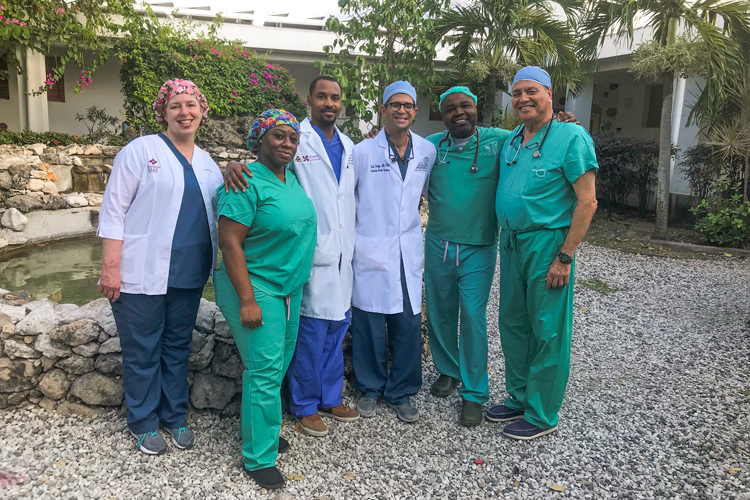Advance your global impact with a Master of Science (M.S.) in Global Health from Nova Southeastern University’s College of Allopathic Medicine. Designed for students from all backgrounds, whether you’re completing your undergraduate degree, shifting careers, or advancing as a healthcare professional, this interdisciplinary program equips you to tackle health challenges worldwide.
Through flexible coursework, hands-on field experiences, and mentorship from global health experts, you’ll gain the skills to address issues like maternal health in Haiti, climate resilience in Ghana, and access to essential medicines in underserved populations. Graduate prepared to lead, collaborate across sectors, and drive lasting change in communities around the globe.
Quick Facts
Key Application Timeline Dates
|
Milestone |
Winter 2026 |
Summer 2026 |
Fall 2026 |
|
Application Opens |
August 1, 2025 |
December 1, 2025 |
January 15, 2026 |
|
Priority Deadline |
October 15, 2025 |
February 15, 2026 |
May 1, 2026 |
|
Final Deadline |
November 15, 2025 |
April 15, 2026 |
August 1, 2026 |
|
Decision Notifications |
Rolling, final by December 15, 2025 |
Rolling, final by April 30, 2026 |
Rolling, final by August 15, 2026 |
|
Classes Begin |
January 5, 2026 |
May 18, 2026 |
August 24, 2026 |
M.S. in Global Health: Program Details
To be considered for the M.S. in Global Health program, applicants must:
- Academic Background: Applicants must hold a bachelor’s degree from a recognized and accredited college or university.
- GPA Requirement: To be considered for admission to the Master of Science in Global Health, applicants should have a minimum GPA of 2.5 in the final 60 semester hours of undergraduate coursework, or a master’s degree with an overall GPA of 3.0 or higher. Alternatively, a combined score of 300 or above on the verbal and quantitative sections of the GRE, taken within the past five years, may fulfill this requirement. Other comparable academic indicators may also be considered. Applicants who do not meet the standard GPA criteria are encouraged to address any academic challenges or extenuating circumstances in their Personal Statement. Additional materials such as letters of recommendation, evidence of relevant work experience, or professional accomplishments may be submitted to support the application and provide a more comprehensive view of the candidate’s potential. In some cases, applicants with a GPA below 2.5 may be considered for provisional admission. This status typically involves enrolling in one course per semester over a specified period to demonstrate academic readiness. However, it’s important to note that provisional admission does not qualify for federal financial aid.
- Academic Transcripts: As part of the admissions process, all applicants must submit official academic transcripts from each postsecondary institution attended. These transcripts provide a comprehensive record of your academic performance and are essential for evaluating your eligibility for graduate study at NSU. Review NSU Office of International Affairs for more details.
Official transcripts must be sent directly from the issuing institution to NSU. Transcripts submitted by the applicant will not be considered official. Transcripts must reflect:
- All completed coursework
- Final grades
- Degree conferral (if applicable)
Additional Requirements for International Applicants
- Translation and Certification
- If academic records are in a language other than English, they must be translated and certified for accuracy by a NACES approved foreign credential evaluator. Evaluating organizations can be found at NACES.org. Please specify that the evaluation must be a course-by-course evaluation including grade point average.
- Required Documents
- International applicants must submit official transcripts. A certified copy of the diploma may be requested depending on the country of origin and transcript format.
- Submission Format
- While electronic submissions are preferred, international transcripts may need to be mailed in sealed envelopes directly from the issuing institution if electronic delivery is not available. Transcripts delivered by applicants will not be accepted as official.
- Translation and Certification
- Personal Statement:
Applicants are required to submit a personal statement that thoughtfully addresses the following prompts. The statement should be well-developed, no more than 500 words, and reflect genuine insight and reflection.
- What motivates your interest in the field of global health?
- What are your professional aspirations after completing the program, and how will earning a degree in global health support those goals?
- Is there any additional context or information you wish to share that may strengthen your application?
Note: Applicants whose undergraduate GPA is below 2.5 should also include a brief explanation of their academic performance, along with any relevant experiences or qualifications that demonstrate their readiness to succeed in a graduate-level program.
- Resume: A recent resume or curriculum vitae (CV) must be submitted as part of the application that highlights academic background, work experience, and relevant skills. The applicant provides this document by uploading a .doc or .pdf file into the application portal.
- English Proficiency: English proficiency is required for international applicants. Accepted exams include TOEFL (minimum 80 iBT / 213 computer-based) or IELTS (6.0+). Scores must be taken within the past two years. As an alternative, completion of two U.S. college-level English composition courses with grades of 2.0 or higher on a 4.0 scale satisfies this requirement.
Follow these steps to complete your application:
1. Submit Your Online Application: Complete the online application and pay the $50 required fee.
2. Send Official Transcripts: Request transcripts from all colleges/universities attended.
Official transcripts must be sent directly from the issuing institution to NSU. Transcripts submitted by the applicant will not be considered official. Transcripts must reflect:
- All completed coursework
- Final grades
- Degree conferral (if applicable)
If your institution issues electronic transcripts, they should be sent to electronictranscript@nova.edu or through a secure transcript service recognized by NSU.
Non-U.S. College or University Academic Transcripts
For international transcripts, a course-by-course evaluation from a National Association of Credential Evaluation Services (NACES) recognized credential evaluation agency (e.g., World Education Services (WES) -- https://www.wes.org/) may be required. Choose course-by-course evaluation with grade point average and select Nova Southeastern University (NSU) as the recipient institution. Visit the NSU Office of International Affairs or www.NACES.org for a list of these organizations.
Submission Guidelines
- Domestic Applicants: Transcripts should be submitted electronically through the application portal or via a secure transcript service. If electronic submission is not available, hard copies may be mailed to Enrollment Processing Services, Nova Southeastern University, PO Box 299000, Fort Lauderdale, FL
- International Applicants: If electronic submission is not feasible, official documents must be mailed directly from the institution in sealed envelopes. It is strongly recommended that applicants use a trackable mailing service.
Important Notes:
- Transcripts must be in English or accompanied by a certified English translation.
- If you are currently enrolled in a program, submit your most recent transcript, and send a final transcript upon degree conferral.
- NSU reserves the right to request additional documentation if needed to verify academic history.
3. Upload Supporting Documents:
Include your personal statement, resume/CV, and two letters of recommendation.
Letter of Recommendation Submission Instructions
During the application process, applicants will be prompted to enter the email addresses of their selected recommenders into the online system. Once submitted, the system will automatically send an email request to each recommender, including detailed instructions for uploading their letter. Please note:
- Letters submitted directly by the applicant will not be accepted.
- Applicants should contact their recommenders in advance to confirm their willingness to provide a letter and to let them know to expect an email from the system.
- Applicants will receive a notification once each letter is submitted, but they will not be able to view the contents of the letters.
4. English Proficiency (if applicable):
Submit TOEFL/IELTS scores if required.
Accepted English Proficiency Tests
NSU’s Global Health program accepts the following standardized tests:
- TOEFL iBT: Minimum score of 80
- IELTS: Minimum overall band score of 6.5
- Score Validity: Test scores must be taken within the past two years to be considered valid
- Additional test options can be found on the Office of International Affairs website
Waiver Eligibility Criteria
Applicants may be eligible for a waiver of the English proficiency requirement under the following conditions:
- English-Medium Education: Proof of English language competency can also be in the form of successful completion of a degree at an approved U.S. institution of higher education or passing Level 9 at Talk International Language School.
- Country of Origin: You are a citizen of, or have completed a degree in, a country where English is an official language and widely used in education and government.
English Language Proficiency Exempt Countries:
- Antigua and Barbuda
- Australia
- Bahamas
- Barbados
- Belize
- Bermuda
- Botswana
- British Virgin Islands (Anguilla, St. Kitts, and Nevis)
- Canada (all provinces except Quebec)
- Cayman Islands
- Dominica
- Fiji
- The Gambia
- Ghana
- Grand Turks and Caicos Islands
- Grenada
- Guyana
- Ireland
- Jamaica
- Kenya
- Liberia
- Malta
- Mauritius
- New Zealand
- Nigeria
- Saints Kitts & Nevis
- Saint Lucia
- Saint Vincent and the Grenadines
- Sierra Leone
- Solomon Islands
- Trinidad & Tobago
- Uganda
- United Kingdom
- Zambia
- Zimbabwe
No other exceptions will be made.
To earn the M.S. in Global Health, students must maintain a minimum 3.0 GPA and complete 34 credits: 17 in core global health courses, 9 in specialized electives, and 8 in a Research Practicum and Thesis. The practicum includes conducting a study, managing data collection and analysis, and completing a thesis that advances global health knowledge. NSU supports students in securing meaningful practicum placements through established and emerging partnerships.
Global Health Information Sessions
Join the NSU MS in Global Health Monthly Information Session to learn about the program curriculum, global field experiences, research opportunities, admissions requirements, and career pathways. You will have the opportunity to ask questions and discover how NSU prepares graduates to address global health challenges through interdisciplinary training and real-world impact.
Please choose a session date and time that best fits your schedule.

Frequently Asked Questions
This interdisciplinary program examines the multifaceted forces that influence health across borders, encompassing social, political, economic, environmental, cultural, and religious factors. You’ll examine how global systems influence access to care, how health disparities emerge and persist, and how interventions can be designed and scaled to improve lives in diverse settings.
Coursework may include topics such as humanitarian response, disease surveillance, health systems in low-resource environments, and the logistics of delivering care, including cold-chain storage and essential medicines policy. You’ll also engage with the ethical dimensions of global health delivery and explore how cultural and religious beliefs influence health behaviors, decision-making, and policy.
Emerging areas, such as digital health, climate resilience, and community-based practice, may be integrated into the curriculum, alongside training in systems thinking, inclusive approaches to equity, and advanced research methods. Through experiential learning and a thesis or capstone project, you’ll gain the skills to analyze complex data, design meaningful studies, and contribute to global understanding. Where your path leads to policy, practice, or research, this program prepares you to lead with empathy, act with precision, and drive change where it’s needed most.
Yes. Students can follow curated focus areas or work with an advisor to design a self-directed track. This flexibility ensures your studies align with your career goals. Examples of focus areas include:
-
Disease Prevention & Control
-
Ethics, Governance & Humanitarian Action
-
Financing Global Health System
-
Health, Development & Conflict Resolution
-
Pharmaceutical Systems in Global Health
Every student completes a 14-week international field research practicum and thesis. With faculty and partner support, you’ll design a study, analyze data, and contribute to global health knowledge in low- and middle-income countries.
Our program prepares you to lead in a world where health challenges transcend borders, cultures, and disciplines. You’ll learn alongside faculty with hands-on experience in humanitarian response, global policy, and health systems innovation. Our curriculum emphasizes ethics, cultural humility, and the social determinants of health, recognizing that religion, tradition, and community values are essential to effective care.
You’ll explore emerging issues such as global pandemic preparedness, the evolving role of digital health and AI in health delivery, and the shifting landscape of infectious disease threats. You’ll also examine challenges in resource allocation and international health governance, while building practical skills in research, leadership, and systems thinking.
For those seeking to deepen their expertise, NSU also offers a Doctor of Health (DHSc) with a Global Health Concentration. Students may be eligible to transfer up to 9 credits from the Global Health (MS) program toward the doctoral degree, streamlining their path to advanced leadership roles in global health research, education, and administration.
Graduates of the M.S. in Global Health program emerge prepared to lead across diverse sectors where health meets policy, innovation, and inclusivity. With a strong foundation in research, ethics, and systems thinking, they are equipped to drive change in global health practice, shape policy, and advance interdisciplinary solutions.
Career paths span humanitarian response, international development, public health research, health systems leadership, and beyond:
| Career Area | Sample Roles |
| Access & Inclusion | Health Equity Officer, Social Determinants Analyst |
| Clinical & Field Practice | Infectious Disease Coordinator, Community Health Specialist |
| Education & Training | Adjunct Faculty, Workshop Facilitator |
| Global Leadership & Strategy | Program Manager, Technical Advisor, International Health Director |
| Humanitarian Relief | Emergency Health Officer, Disaster Response Coordinator |
| Innovation & Consulting | Global Health Consultant, Innovation Analyst, Development Associate |
| International Organizations | WHO Fellow, UN Project Assistant, Global Partnerships Coordinator |
| Policy & Advocacy | Policy Analyst, Public Affairs Advisor, Global Health Strategist |
| Research & Analytics | Epidemiologist, Health Data Specialist, Program Evaluator |
This program is designed for purpose-driven individuals eager to make a meaningful impact in global health. Whether you’re a recent graduate passionate about social justice, a pre-med or health-adjacent student seeking broader context beyond clinical care, or a professional looking to pivot into international health, the M.S. in Global Health provides the interdisciplinary foundation and practical skills to lead with insight and compassion. With a foundation in ethics, cultural humility, and systems thinking, the program empowers students to address complex health challenges that span borders, traditions, and sectors.
The M.S. in Global Health is offered in two formats: fully online or on-site at NSU’s Fort Lauderdale/Davie campus. Both follow the same curriculum and academic standards. Students may choose to complete the program 100% online or on campus, and in some cases, may switch between formats depending on course availability. Since not every course is offered in every format each term, students should plan ahead with their academic advisor to stay on track for graduation.
Students can begin the program in the Fall or Winter semesters, with the first cohort starting in Winter 2026 (January start). Summer courses may be available, but new students are admitted in Fall and Winter only. You may enroll full-time or part-time depending on your schedule.

Contact Us
If you have any questions related to the Global Health program, please reach out to:
For any admissions-related inquiries, please contact:

